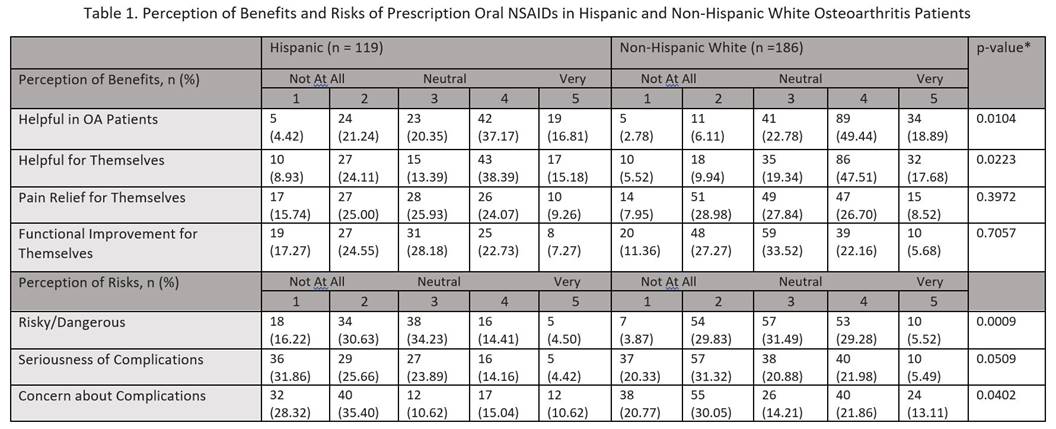Session Information
Date: Tuesday, October 23, 2018
Title: Patient Outcomes, Preferences, and Attitudes Poster II: Patient Perspectives
Session Type: ACR Poster Session C
Session Time: 9:00AM-11:00AM
NSAIDs are commonly prescribed for the treatment of OA. While there are documented differences between Hispanics and non-Hispanic whites (NHWs) in their treatment preferences for arthroplasty, little is known about ethnic differences in treatment preferences for NSAIDs. The extent to which minority patients convey reluctance to accept proven treatments can contribute to disparities in the utilization of these treatments and in clinical outcomes. The purpose of this study was to determine if there are ethnic differences in OA patients’ treatment preferences for, familiarity with, and perceptions of efficacy and risk of prescription NSAIDs.
Methods:
Participants with chronic, frequent pain due to knee or hip OA were recruited from a university medical center. Those with cognitive dysfunction, hip/knee arthroplasty, and inflammatory arthritis were excluded. Participants were given a questionnaire to assess their knowledge and attitudes towards OA treatments, including questions regarding their willingness to receive (2 items), familiarity with (3 items, yes/no), and perceptions of benefits (4 items) and risks (3 items) of both prescription oral and topical NSAIDs. Responses to all (except familiarity) question items were based on a five-category ordinal response scale. Fisher’s exact or Wilcoxon-Mann-Whitney tests were conducted to determine if individual items of knowledge and perceptions about prescription NSAIDs differed by ethnicity.
Results:
In our cohort of patients with knee or hip OA, Hispanics (n=119), in comparison to NHWs (n=186), were younger (mean age 61.5 vs. 65.6) and less likely to have an annual income of ≥$40,000 (21.6% vs. 55.8%). No differences were found between Hispanics and NHWs in willingness to try prescription oral or topical NSAIDs. Hispanics were less likely to have heard about prescription oral NSAIDs as treatment for OA compared to NHWs (75.22% vs. 85.95%, p=0.0293). Hispanics were less likely to believe oral NSAIDs are helpful in OA patients (p=0.0104) or for themselves (p=0.0223), but they were also less likely to believe oral NSAIDs are risky or dangerous in OA patients (p=0.0009) or have concerns about complications from the medication (p=0.0402) compared to NHWs (Table 1). Additionally, Hispanics were less likely to believe topical NSAIDs are harmful compared to NHWs (p=0.0040). Items pertaining to familiarity with and perceptions of benefits of topical NSAIDs did not significantly differ by ethnicity.
Conclusion:
Among patients with knee or hip OA, Hispanics were less familiar with oral NSAIDs, less likely to believe in their efficacy, and less likely to believe that they are harmful, compared to NHWs. Treatment preferences for prescription NSAIDs however did not vary by ethnicity. Improving patient knowledge and attitudes about prescription NSAIDs may reduce ethnic differences in the utilization of this OA treatment.
To cite this abstract in AMA style:
Masood H, Hannon MJ, Kwoh CK, Dagnino J, Vina E. Examining Ethnic Differences in Osteoarthritis (OA) Patients’ Knowledge and Attitudes Regarding Prescription Nonsteroidal Anti-Inflammatory Drugs (NSAIDs) [abstract]. Arthritis Rheumatol. 2018; 70 (suppl 9). https://acrabstracts.org/abstract/examining-ethnic-differences-in-osteoarthritis-oa-patients-knowledge-and-attitudes-regarding-prescription-nonsteroidal-anti-inflammatory-drugs-nsaids/. Accessed .« Back to 2018 ACR/ARHP Annual Meeting
ACR Meeting Abstracts - https://acrabstracts.org/abstract/examining-ethnic-differences-in-osteoarthritis-oa-patients-knowledge-and-attitudes-regarding-prescription-nonsteroidal-anti-inflammatory-drugs-nsaids/

